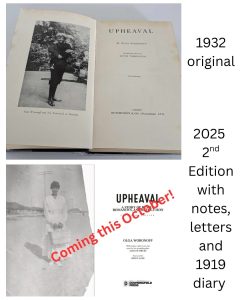Ask your family. I’m lucky. My cousin on my father’s side of the family compiled a comprehensive genealogy of our family, wrote books on the subject and developed several family trees. My aunt wrote a journal which, despite being in German, is a valuable resource for me. I’ve also asked the older members of my father’s family for family stories. Unfortunately, none of them can remember, or maybe they don’t want to remember, as the period I’m asking about includes WWII and my father’s family are Baltic Germans.
When I begin to research my mother’s family, I won’t be so lucky. I don’t know anyone from that side of the family who is still living and any documents I have are all in Russian. I believe one of the documents is my grandmother’s family tree, but I have little information on my grandfather’s side.
Use the internet. I’ve used both Ancestry.com and MyHeritage.com, the second for DNA testing. The DNA tests were slightly surprising, but pretty much confirmed what I already knew. However, I wasn’t expecting to be 50% Scandinavian! Ancestry.com searches similarly confirmed most of what I already knew but were still useful for placing dates, etc. I also found a couple of family trees online, unfortunately none of them have given me any new information.
The internet is useful for historical searches about happenings and local news. If you know where your family lived, you can search for newspapers or articles about the area at the time they lived there. Much of my research is about the Baltic States around 1919 and the German army during WWII. There is quite a bit of information online about both, including personal stories.
Read books. I’m constantly amazed at the number of books, written either as memoirs or collections of personal stories, which give me plenty of information about the history of the times my family lived through. These stories are invaluable for learning how people felt during the times I’m researching. They are not directly about my family but are definitely a good way to get a feeling for the what was happening. My grandparents on my mother’s side of the family fled Russia during the Revolution. Fortunately for me, there are plenty of books about people in similar situations. I’m very lucky as my grandmother also wrote a book about their escape.
One of the most harrowing books I read about the treatment of German women toward the end of the war was “A Woman in Berlin”, written anonymously by a woman who experienced multiple rapes at the hands of the Russian soldiers. Sheila Fitzpatrick’s “Mischka’s War” was another book which gave me an understanding of the horror of WWII.
Watch documentaries, television series and movies. My father was in the German army and I’m constantly trying to find more information on the soldiers who, like him, didn’t want to be drafted. I have Foxtel and find their History channel invaluable for documentaries on WWII. I’ve saved many of them to watch again. I believe the best documentaries are the ones which include footage from the time, as well as personal stories, which are helpful for understanding how people felt and reacted. I watched the television series “Generation War”, titled in the original German, “Unsere Mütter, unsere Väter” (Our Mothers, Our Fathers), which follows the stories of five German friends who live in Berlin in 1941. This movie gave me an insight into the feelings of the young boys who were drafted into the Wehrmacht and the horrors of the battles.



